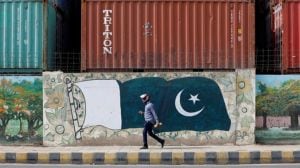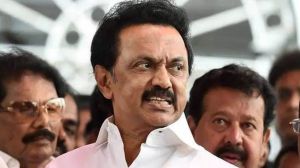Majority report
There is no such thing as political untouchability in India, opposition leader L.K. Advani is fond of asserting. This when not so long ago a...

There is no such thing as political untouchability in India, opposition leader L.K. Advani is fond of asserting. This when not so long ago all secular forces treated the BJP and its precursor, the Jan Sangh, as political pariahs. Even its Janata Parivar allies were embarrassed by the party8217;s Hindutva line, and only wanted to exploit the party8217;s organisational skills in mustering crowds and putting up shamianas. Today it is a different story. An old Emergency stalwart like Vidya Charan Shukla has joined the BJP. So has Sanjay Gandhi8217;s widow Maneka and her son Feroze Varun. A leading light of Rajiv Gandhi8217;s shouting brigade in Parliament like S.S. Ahluwalia is today on the other side of the political divide. Arun Singh, once considered Rajiv8217;s closest friend, was the trusted adviser to the BJP8217;s Jaswant Singh in the last government. Liberal minded Muslims like Najma Heptullah and Arif Mohammed Khan have also joined the BJP, even if their timing was a trifle off the mark.
And it is not as if the lines have blurred in only one party. The Congress today includes many former enemies of the Gandhi family. Ram Jethmalani, who took on the role of Inspector Closeau in trying to dig dirt on the Gandhi family, is now squarely in the Congress camp. Ambika Soni, who was once a lieutenant of Congress rebel Sharad Pawar, is today Sonia Gandhi8217;s standard bearer who cracks the whip at even the slightest hint of disloyalty in the ranks. Renuka Chowdhury, who once used her considerable lung power to out shout the Congress back benchers in Parliament, shed more copious tears than anyone else in the Congress Parliamentary Party at the thought of Sonia Gandhi not becoming PM.
Regional Tamil parties like the MDMK and PMK have hopped across from the AIADMK to the DMK and from BJP to Congress with the ease of experienced trapeze artistes, the only consideration being who would deliver the vote. Ajit Singh is particularly promiscuous in switching camps, but he does have a creditable record of landing on the winning side.
For a long time Sonia Gandhi remained standoffish to those she, no doubt, considered the riff raff of Indian politics. But finally wisdom dawned that if she did not climb down from her elitist pedestal and bury the hatchet with some of her former political foes the Congress might get left behind yet again. After all, the BJP8217;s parliamentary poll victories of 1998 and 1999 were due as much to the electoral arithmetic of its alliances as to its own and Atal Bihari Vajpayee8217;s popularity.
In 2004 Gandhi swallowed her pride to make peace with many political opponents. Pawar, who was once ejected from the Congress kicking and screaming, became a valued ally. So did the DMK which was once accused of complicity in Rajiv Gandhi8217;s assassination and was the ostensible reason for the Congress toppling the United Front government. Interestingly, one of Gandhi8217;s key advisers in forming electoral alliances was none other than V.P. Singh, who was accused by her late husband of stabbing him in the back and whose electoral campaign of 1989 was centred around corruption and Bofors.
Considering the Congress8217;s new policy of letting bygones be bygones, it is puzzling why Gandhi continues to cold shoulder a powerful potential ally like Mulayam Singh Yadav, who could add a chunk of 36 MPs to the UPA8217;s bare majority of 275 in Parliament. Amar Singh8217;s graphic account of his public humiliation at the meeting at which the UPA alliance was sewn up at 10 Janpath indicates that the Congress leadership went out of its way to make it clear to him that it considered him a persona non grata. Singh was made to wait outside the meeting room while Ahmed Patel went to check with his boss if he could be permitted entry. Even after he was ungraciously ushered in, Congress MPs, other than Ghulam Nabi Azad, cold shouldered him. Those who had been regulars at his famous birthday bashes cut him dead. The final insult was that Jairam Ramesh refused to include his name as one of the UPA allies.
Amar Singh feels the opposition to the Samajwadi Party comes from 8216;8216;the very top of the Congress8217;8217;. Strengthening this suspicion are Rahul Gandhi remarks in Amethi against the SP. So what is the deep dislike of the SP all about? Is it that Gandhi cannot forgive Amar Singh and Mulayam for refusing to back her when she claimed that she had the support of 272 MPs upon the fall of the Vajpayee government in 1999? Is the Congress bitter because the SP8217;s candidates sabotaged its chances in several seats all over the country? Is the real red rag the presence of Amitabh Bachchan, once a close personal friend of the Gandhis, in the SP fold? Is it the belief that the Congress can only regain UP by opposing the Samajwadi Party since the two parties share a common vote bank? Is it that the Congress still hopes for an alliance with the elusive Mayawati?
Whatever the reason for treating SP leaders like social pariahs, the move smacks of extremely poor political judgement. The Vajpayee government during its first term in office was shaky and indecisive precisely because the PM was preoccupied trying to mollify his allies, particularly Jayalalithaa. But in his second stint as PM, Vajpayee was a new man, confident and able to take unpopular economic decisions despite opposition from his alliance partners. The difference in governance was because in 1998 Prime Minister Vajpayee had a wafer thin majority in Parliament and could not afford to alienate a single ally. In 1999 Vajpayee had the comfortable support of around 300 MPs and no single party was in a position to hold him to ransom.
It is inexplicable why the Congress should have kicked out an important crutch in ensuring the stability of the Manmohan Singh government. By rebuffing Mulayam it has boxed itself into a corner. It is dependent on the Left and Laloo Prasad Yadav on every issue, both of whom naturally assume that they are indispensable. If Mulayam8217;s solid block of MPs was squarely with the Manmohan Singh government it would not be so vulnerable. Keeping Amar Singh waiting outside on a small chair instead of laying out the welcome mat may in retrospect have been a grave error of judgement.
- 01
- 02
- 03
- 04
- 05































